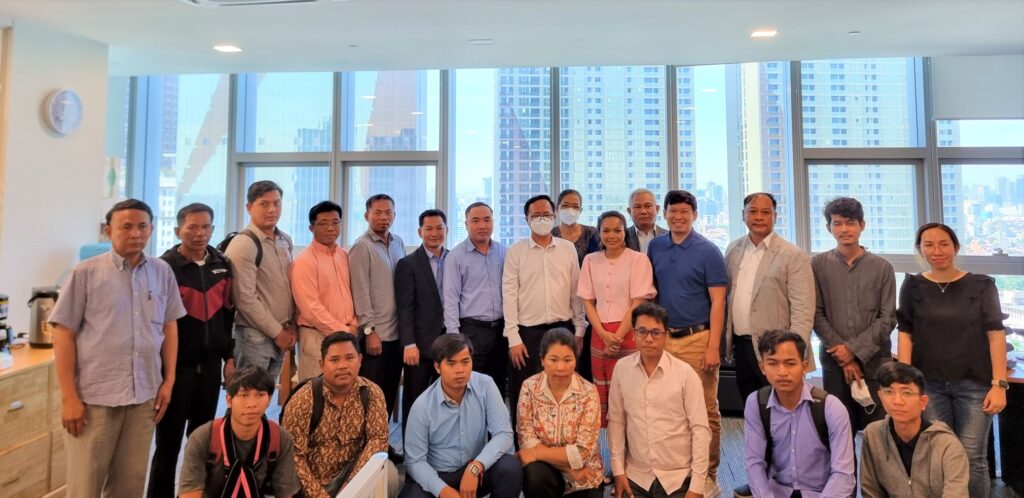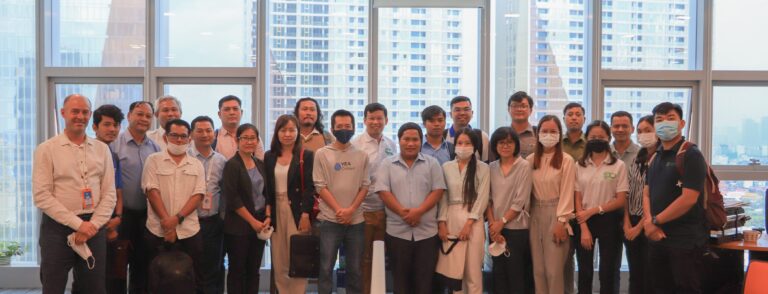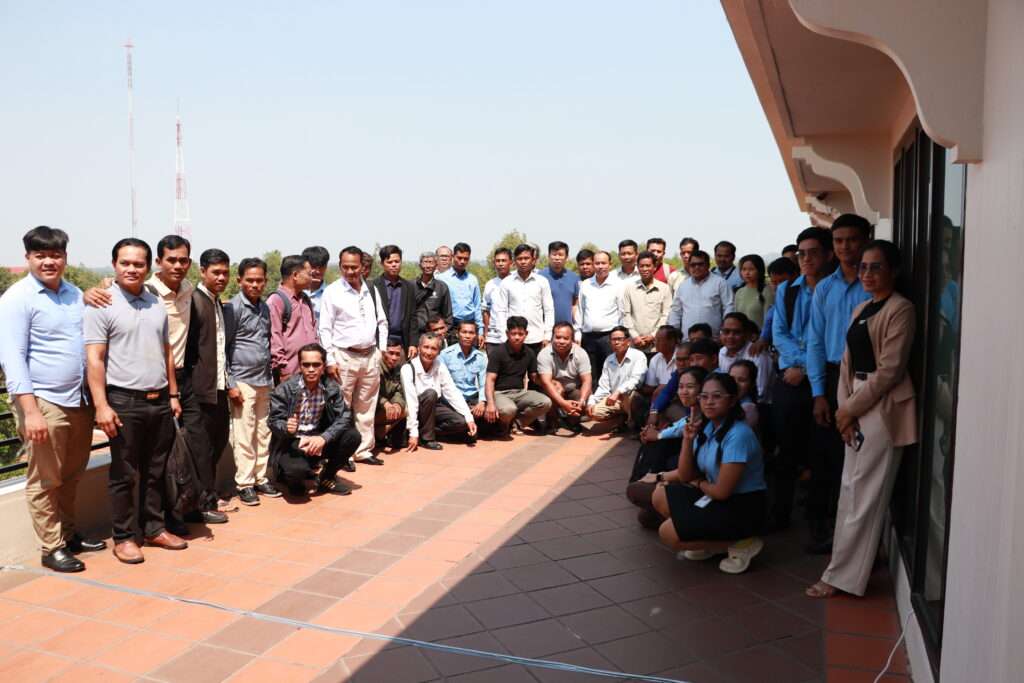- Learning Platform
- Blog
- Sixth Science Talk on the drought situation in Cambodia
CamboJA, in collaboration with the Open Development Cambodia Organization (ODC), organized the 6th Science Talk on the Drought Situation in Cambodia on 30 January 2024. The event was attended by 35 participants (19 women), including representatives of civil society organizations, university students, and journalists.

Thank Mr. Hour Ix, Reginal Drought Management Expert of the Mekong River Commission (MRC), for sharing his experience, knowledge, and expertise on this topic.
This activity is funded by USAID through FHI360, under the Civil Society Support (CSS) project, and co-implemented by CamboJA and the Open Development Cambodia Organization (ODC).

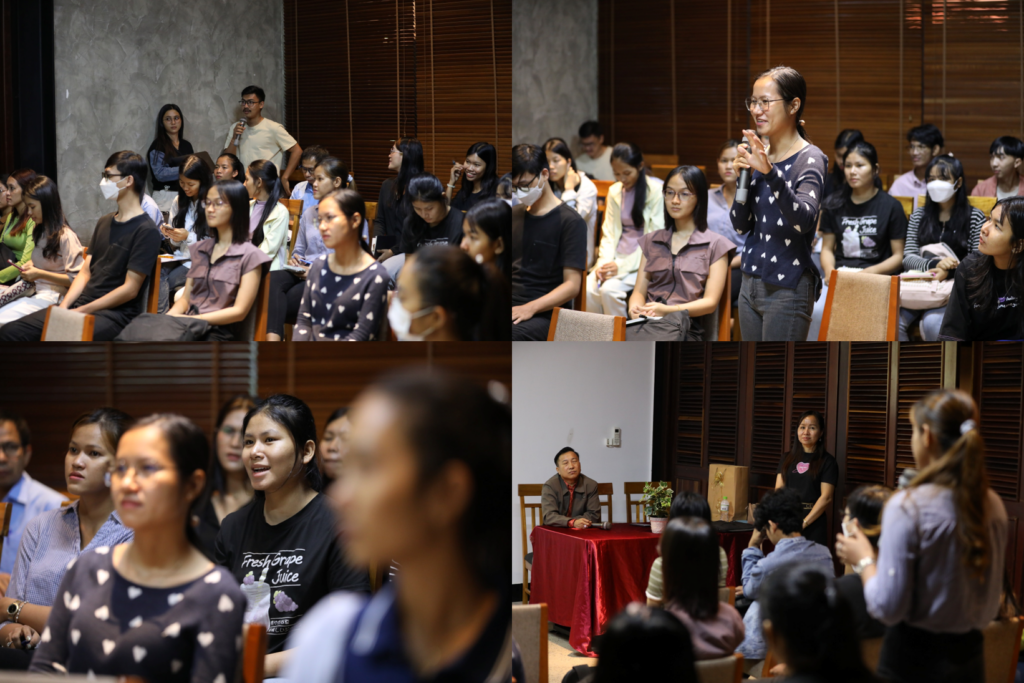
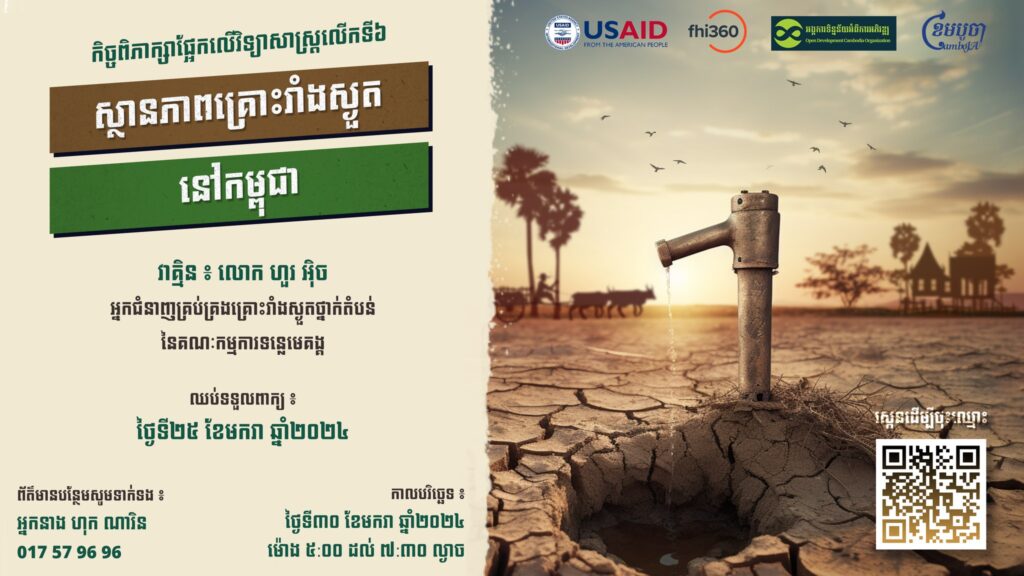
Other Stories
The second cluster convention
The second cluster convention was held on 19 December 2022, at the FHI 360 Office in Phnom Penh, with 25 participants (06 females). The convention brought together the Ministry of Land Management, Urban Planning and Construction (MLMUPC), the Ministry of Interior (MoI), civil society organizations (CSOs), community-based organizations (CBOs), media groups, and representatives of indigenous people from Preah Vihear, Ratanakiri, and Mondulkiri provinces. Open Development Cambodia (ODC) hosted the convention, which was funded by the United States Agency for International Development (USAID) through Family Health International (FHI 360) under Cluster Anchor Grant from the Civil Society Support (CSS) Project. ODC is the anchor and collaborates with three cluster members: CamboJA, the Conserve Indigenous Peoples Language Organization (CIPL), and Young Eco Ambassadors (YEA). The project aims to make natural resource management (NRM) more sustainable, inclusive, and participatory by incorporating Indigenous Peoples’ needs and concerns. ODC hosted an initial cluster convention on 13 September 2022 to involve all the cluster members and networks to build the networks, learn from each other, map the significant strategy, and step on further activity on the natural resource management (NRM) advocacy in Cambodia. In this convention, we will update the progress of the indigenous communal land titling in Cambodia, which is a curious and significant topic for today’s talk. The convention aims to: Create a friendly environment for networks to learn and share Keep current updates on the indigenous communal land titling in Cambodia Encourage cluster members and stakeholders to work together. The representative of the Ministry of Land Management, Urban Planning and Construction (MLMUPC) and the Ministry of Interior (MoI) shared the current update on the indigenous communal land titling. Currently, 152 indigenous communities have registered as legal entities with the MoI, while 94 communities have requested communal land titles from the MLMUPC. Due to various challenges and encounters, 26 of these communities were suspended. Some people may be interested in obtaining private land ownership to sell or in obtaining a micro-finance loan. In some cases, the requested land overlaps with natural protected areas and forest cover 2002 established by the Ministry of Environment (MoE) and the Ministry of Agriculture, Forestry and Fisheries (MAFF). Currently, 38 indigenous communities in four provinces have received communal land titles totaling 39,342 hectares: Stung Treng (02 communities), Kratie (04 communities), Mondulkiri (07 communities), and Ratanakiri (25 communities). Two more communities are expected to receive communal land titles by January 2023. The convention also discussed the challenges of land titling. The participants had the chance to question ministries and ask for advice to solve their problems. The process of the land tiling is complicated and time-consuming. The land title sometimes cannot be issued and is suspended due to several challenges. Due to the limitations of the indigenous people\'s knowledge of the Khmer language, legislation, and registration procedures, they always find it difficult to obtain land titles without support from the CSOs and CBOs. In some cases, indigenous peoples are unaware of the benefits of communal land titles. Some community members may see the personal benefits as superior to the sharing and wish to withdraw from the community. It meant that they would like to have their private land title. The local authorities sometimes do not reluctant with the indigenous communities regarding the land titling procedures even though the ministries are trying to speed up the land registration. In many cases, the community refuses to accept the land that the government is willing to provide. After the participatory discussion, the indigenous community is encouraged to document the issues or problems with communal land titling and report them to the working group. ODC will continue to host the quarterly cluster convention with the cluster member and networks to share lessons learned, information, and prioritized issues on natural resource management, environment, forestry, land, indigenous peoples, the strategic environmental assessment (SEA), and environmental impact assessment (EIA).
- Communal land titlingEthnic minorities and indigenous people
- 27 Dec 2022
- 1381
The initial cluster convention
The Initial Cluster Convention was held on September 13, 2022, at the FHI 360 Office in Phnom Penh, with 29 participants (10 females), including 06 indigenous peoples. The convention brought together media organizations, civil society organizations (CSOs), and community-based organizations (CBOs) working on indigenous peoples, natural resources, forestry, land, and the environment. Open Development Cambodia (ODC) organized the convention, which was funded by the United States Agency for International Development (USAID) through Family Health International (FHI 360) as part of the Civil Society Support (CSS) Project: Cluster Anchor Grants. ODC is the anchor and collaborates with three cluster members: CamboJA, the Conserve Indigenous Peoples Language Organization (CIPL), and Young Eco Ambassadors (YEA). The project aims to make natural resource management (NRM) more sustainable, inclusive, and participatory by incorporating Indigenous Peoples\' needs and concerns. The projects contain 26 major activities. One of the important parts is the convention, which clusters members and the host of their network to share lessons learned, information, and prioritized issues on natural resource management, environment, forestry, land, indigenous peoples, Strategic Environmental Assessment (SEA), and Environmental Impact Assessment (EIA). The cluster members will be integrated through physical meetings as a project initiative. ODC hosted the initial cluster convention, which brought together all cluster members and networks to build networks, learn from one another, map the effective strategy, and pave the way for future NRM advocacy activity in Cambodia. As a result, the initial cluster convention has four core objectives, including: Explaining the nature of cluster formation and the roles of each cluster Create a friendly learning and sharing environment for cluster members and their networks Keep current priority environmental issues, as well as environmental laws and regulations, up to date Encourage cluster members and stakeholders to work together. Natural resource management issues are arising in the country, particularly land grab and encroachment, economic land concession, communal land titling, forestry, and environment and social fund, among others. On the other hand, the prioritized issue could be related to forestry. Many CSOs fail to focus on the Investment Law, which is at the heart of the development project, causing many problems for local communities. The law should be thoroughly reviewed, particularly regarding indigenous peoples and natural resource management. If the law is not carefully studied, residents may face difficulties if there are any development projects or investments in their areas. The communities lack precise information on the development project and strategy that address the issues. Natural resources are indigenous peoples’ last hope; therefore, they must be protected. As a result, indigenous peoples should broaden their alliances in each campaign and workshop.
- Ethnic minorities and indigenous peopleLand and natural resources
- 27 Sep 2022
- 1758
Civil society’s participation in the draft Land Law dialogue for land rights protection
The Cambodian government has drafted an entirely new Land Law (the draft law), more than 20 years after the promulgation of the 2001 Land Law. Acknowledging the importance of participation from civil society, local communities, and indigenous peoples (IPs), Open Development Cambodia (ODC) formally sought an opportunity to review the draft law and was able to provide constructive inputs based on dialogues with relevant stakeholders. In late January 2024, the Ministry of Land Management, Urban Planning and Construction (MLMUPC) drafted a comprehensive new Land Law, comprising seven titles, thirteen chapters, and a total of one hundred and ninety-nine articles. ODC formally submitted an official letter to the MLMUPC, requesting an opportunity to review and provide constructive inputs on the draft law. The MLMUPC approved the request and shared the draft law with ODC, providing a short window until 16 February 2024 for submitting inputs. Dialogues highlighting key issues such as the need to protect collective rights, in particular, the rights of Indigenous peoples ODC hosted two dialogues on the draft new Land Law – one on 13-14 February in Siem Reap Province and another on 15 February in Phnom Penh. The two dialogues were supported by the United States Agency for International Development (USAID) through Family Health International (FHI 360) under a Cluster Anchor Grant from the Civil Society Support (CSS) Project, ALIGN and LANDESA. During the first dialogue, a Cambodian legal expert presented an analysis of key articles of the draft Land Law to the participants. The participants then discussed and provided their inputs, concerns, and recommendations for the draft law. Representatives from Indigenous peoples’ (IP) communities who were present during the dialogue raised concerns about the limited time provided for comprehending the proposed legal amendments, conveying their understanding to the communities, and gathering inputs from their members. They felt that the dialogue was more of an informative session than a consultative one. As a result, representatives from the indigenous communities were unable to provide their input on the draft law and requested an extension of time for the consultation process. ODC and our partners sympathized with the response from the IP communities, as the timeline for the input was also a huge challenge for the team. The second dialogue was held on 15 February in Phnom Penh, to consolidate the inputs and recommendations derived from the first dialogue in Siem Reap Province. Following the dialogues, ODC and partners prepared and submitted the consolidated inputs and recommendations to the MLMUPC. The document is published on the ODC website, and is publicly accessible. The document highlights several key issues, such as the need to clarify the protection guarantees for collective ownership, right to use, right to enjoy the fruit of the land and rights related to land and other immovable properties of IPs and Buddhist monasteries. The input also requested further consideration towards gender equity and the protection of the rights of IPs and local communities. In early March, ODC attended a meeting hosted by the Land Law Working Group at the MLMUPC. According to the MLMUPC, more than 15 inputs from ODC were incorporated, including issues regarding the classification of public state land and private state land, the timeframe for the registration of communal land titles for IPs, promotion of equity in land rights and land administration, the specification of a timeframe for complaints, a filing process for complaints, and elaboration on the glossary. ODC and our partners shared concerns regarding the time window for the submission of input. The time window for translating the draft law into English and sharing it with our international legal experts, as well as holding dialogues, meant that the input document did not cover all the key points as thoroughly as it could have, if more time were given in the first round. After the input submission, ODC hosted additional discussions and meetings and collaborated with partner organizations to gather more inputs. On 11 March 2024, ODC hosted a knowledge sharing session on Women\'s Rights in Land Ownership and Natural Resource Management (NRM). Additionally, on 22 March 2024, ODC attended a meeting held by the Land Law Working Group of the MLMUPC to discuss the inputs that the working group has received so far. On 26 March 2024, ODC attended another workshop hosted by MLMUPC on the draft law. Then, on 26 April 2024, ODC and partner organizations supported a meeting organized by My Village (MVi) for consultation on the draft law, focusing on the process and challenges of indigenous communal land titling. According to a Ministry officer, MLMUPC will continue to review and incorporate inputs as appropriate and will share a further revised draft law with relevant stakeholders. Based on that advice, ODC and partner organizations continued to review and collect further inputs for the revised version of the draft law and submitted our second round of inputs on the revised draft law on 7 June 2024. On 19 June after submission of our inputs on the revised draft law, MLMUPC shared with ODC the latest version of the draft law. ODC observed that none of our second round of inputs were taken and incorporated in the latest draft. ODC and partner organizations wish to be given further opportunity for a more constructive and serious consultation with the MLMUPC to discuss our inputs point by point. The importance of national and international alliances to ensure an inclusive land law reform that protects the rights of all citizens The collaboration with ALIGN and LANDESA has enabled ODC to engage in consultations with national and international stakeholders on the land law reform process in Cambodia, aligning with relevant international standards and principles of responsible investment in land governance. By uniting all stakeholders, ODC tries to promote transparency and responsible investment in land in Cambodia. The inputs submitted by ODC amplify the voices of local communities to the government, an important factor for promoting sustainability and inclusivity in land rights for every Cambodian. While not all inputs and recommendations from ODC and our partners are expected to be taken by the government, the collaboration has sparked important discussions, particularly concerning land rights and land administration among underrepresented groups such as IPs, women, widowers, and LGBTQ+ individuals. Moving forward, ODC commits to continue working with partner organizations and stakeholders to discuss and explain our second round of inputs and provide more precise and complete suggested changes to the draft law to ensure that the new law is enabling, inclusive, equitable and effective, with minimized unintended negative impacts on vulnerable groups such as traditionally separated spouses, IPs and their communities, LGBTQ+ and unregistered land possessors, and avoiding regulatory or administrative taking of land and immovable property rights without fair and just compensation.
